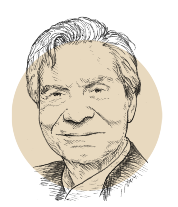In 2003, Jacques Chirac broke with George W. Bush over the Iraq War, refusing to become an ally in the destruction of Saddam Hussein’s regime. The American military stalemate would vindicate Chirac, but, at the time, Americans found his opposition unacceptable. In Washington D.C., it was decided that the name of the fries served at the Congress cafeteria should be changed from “French fries” to “freedom fries.” (Too bad for Thomas Jefferson who, having discovered fries in Paris, introduced them to the White House menu.) The French ambassador at the time, Jean-David Levitte, had another worry: Would Congress remove the bust of Lafayette that faced Washington’s in the Capitol rotunda? The anecdote is amusing, but it symbolizes the French-American relationship, which has often been stormy although without ever falling apart. The storms are left unmentioned by the new United States ambassador to Paris, Denise Bauer, a longtime Democrat. According to her, all is well, there is nothing to see here. This reveals either her talent for diplomacy or her indifference to a long history.
This history is first and foremost about money. Since the War of Independence, France has provided loans to the United States, or vice versa, in every conflict. And both parties have been reluctant to repay their debts. Have the funds granted to the insurgents by the government of Louis XVI been returned? Yes, according to American historians, but there is less certainty on the French side. After the Napoleonic Wars, the misunderstanding was more serious. Louis XVIII’s government recognized that Napoleon’s continental blockade destroyed American maritime trade and that a number of U.S. ships were seized or destroyed. The United States proposed a sum, which the French had no intention of settling. President Andrew Jackson seriously considered declaring war on France, but Congress resisted. Things then fell into place with Louis-Philippe, who had lived in exile in the United States during the French Revolution. An agreement was reached with the American ambassador in Paris for five million dollars, and this was paid.
After World War I, France did it again. It was thought that the blood spilled by both our countries should erase the debt. However, this was not how Republican presidents understood the matter. Calvin Coolidge, notorious for the brevity of his communications, declared: “They hired the money, didn’t they?” The reply from Paris was à la française. They rushed their most famous ambassador, the writer Paul Claudel, to Washington. He spoke to them of poetry throughout the seven years of his stay. Who would dare speak of money? After Franklin Roosevelt was elected, Paul Claudel returned to France, and the balance of the debt got lost in the sands of World War II. A new debt, though one largely compensated by the funds of the Marshall Plan, was accepted by the French in 1946, payable and paid in devalued currency.
The guerilla warfare over debt would be followed by conflict over trade, featuring the chicken war of 1961-64. Europe was taxing American poultry imports to give Europeans time to develop domestic breeding that was price-competitive. In return, in December 1963, Lyndon Johnson raised tariffs on French cognac and brandy! This was to be the first of many incessant quarrels, which continue today, the most notorious of which is the rivalry between Boeing and Airbus (or Tesla and ACC, the Franco-European consortium developing batteries for the electric vehicles of the future). One of the latest episodes is a Buy European Act suggested by Emmanuel Macron in response to Joe Biden beefing up the Buy American Act of 1933. Friendship does not exclude competition, fair or otherwise.
Strategic disagreements have more serious consequences. When General de Gaulle left the military command of NATO in 1966, it was not only as revenge for the hatred that Franklin Roosevelt bore toward him. He thought that Europe needed to embody a third way between the United States and the Soviet Union. Once the Cold War had come to an end, Nicolas Sarkozy, by no means of third-world sensibility, re-joined NATO. Does this mean the end of the Gaullist dream of an independent Europe? Not really. Though allies in the war in Ukraine, Emmanuel Macron and Joe Biden are not singing from the same hymnbook. The Americans envision weakening Russia once and for all; the French want to save Ukraine although they do not believe Russia will disappear, but that it will instead remain a neighbor, and a turbulent one.
The French-American relationship does not play out solely on the battlefield, or among bankers. Denise Bauer is right about this much: The sky is calm on both sides of the Atlantic, and the cultural exchanges are intense. The traditional anti-Americanism of French intellectuals is now archaic. The old opposition of la France éternelle vs. Americanization has been replaced by a more serious debate: democracy versus despotism. On this question, France and the United States are obviously on the same side.
Editorial published in the December 2022 issue of France-Amérique. Subscribe to the magazine.












